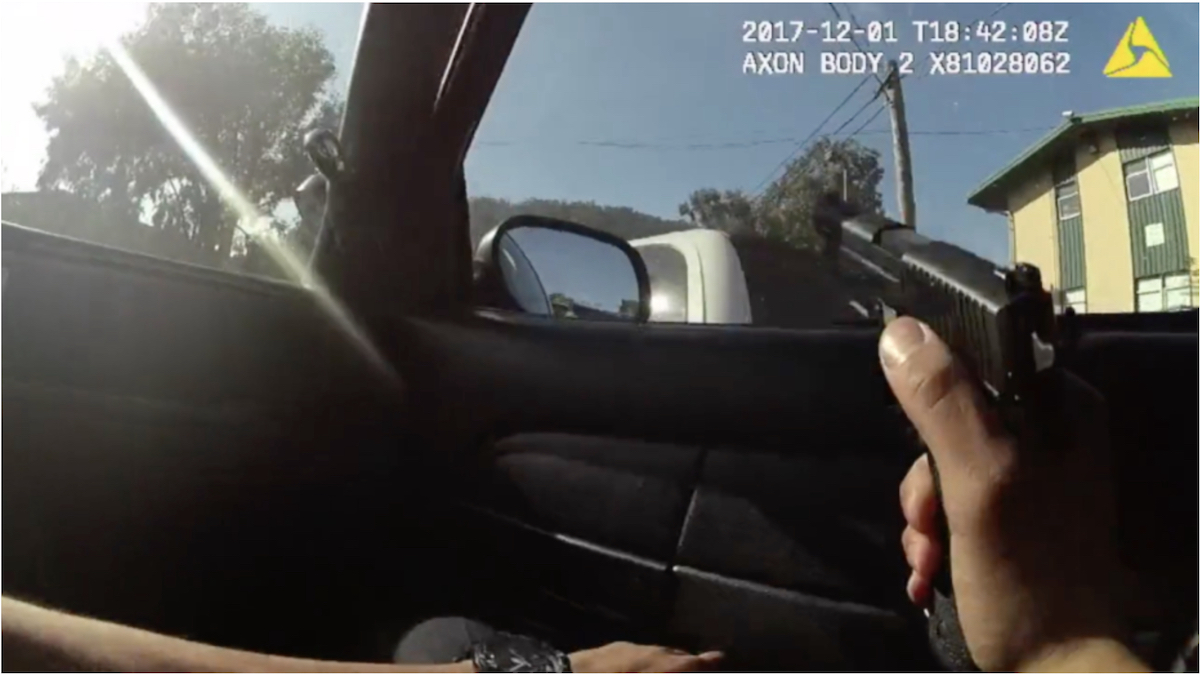A San Francisco Police Department investigation found that the rookie police officer who shot and killed alleged carjacker Keita O’Neil through his squad car window in 2017 acted within the department’s policies, bringing an end to one of the city’s most controversial police shooting cases in recent years.
Chris Samayoa was just days on the job when he and his training officer chased the unarmed, 42-year-old O’Neil through the Bayview as he purportedly fled in a white lottery van.
The internal police investigation found Samayoa only violated the department’s body-worn camera and seat belt policies, but found no wrongful use of force, according to records obtained by Mission Local. Samayoa was not wearing a seatbelt, and former Police Chief Bill Scott noted that Samayoa should have activated his camera during the car pursuit, and only did so at the scene.
Scott dismissed Samayoa from the police force, even though he ultimately agreed not to hold Samayoa in violation of various policies.
“I have serious concerns about the tactics and tactical judgment used [by] Officer Samayoa in this incident,” Scott wrote in a February 2024 letter, stating that Samyoa, who was sitting in the passenger seat, drew his gun “prematurely” while his squad car was still moving, before it rounded the corner to the dead-end street where O’Neil was.
“This is most likely due to Samayoa’s lack of experience coupled with absolutely no guidance or direction from his [field training officer] partner,” Scott wrote, referring to Officer Edric Talusan.
Samayoa was only three days on the job, records show, and had never conducted a traffic stop. O’Neil’s mother was paid a $2.5 million settlement for his death.
Records show that in January 2018, Scott also spoke against an internal department panel’s recommendation that Samayoa be reinstated to work as a police officer. That March, Scott terminated Samayoa’s employment.
Samayoa faced nine total allegations. Six of those had to do with Samayoa’s use of force, such as whether it was disproportionate and whether there was an immediate threat.
Scott wrote that Samayoa’s lack of experience was a factor in not disciplining Samayoa. “However, the consequences that occur from unsound tactical judgment and decisions can be dire,” he wrote, “and they were in this incident.”
O’Neil’s aunt April Green said she appreciated the acknowledgement from Scott, but that it wasn’t enough.
“It’s very disappointing that he would flip-flop and justify his behavior for murdering an innocent Black man who was unarmed,” Green said. “It’s unfortunate and sad that the accountability for officers that abuse their position is so carelessly handled by [those] that we trust and charge to oversee them.”
As the chase reached a dead-end street, O’Neil exited the lottery van and began to flee on foot.
Samayoa said he believed O’Neil was running towards him, and that O’Neil was reaching for a gun.
“I felt like I was being ambushed and so I drew my weapon and fired,” Samayoa said in an interview. “In my head I’m thinking, I’ve got to get the first shot out if I’m about to get killed.”
Samayoa was one of a few police officers who was criminally charged by former District Attorney Chesa Boudin for the shooting. Only one of Boudin’s police violence cases went to trial, the others were dropped after Boudin was recalled and replaced by District Attorney Brooke Jenkins.
Jenkins moved to dismiss the O’Neil case, alleging that Boudin filed the criminal case against Samayoa for “political” reasons. She asked Attorney General Rob Bonta to review the case, which he ultimately dropped in May 2023.

